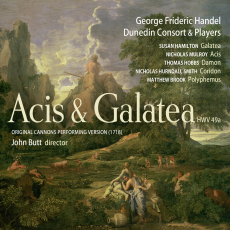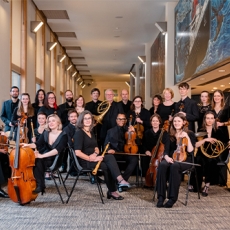Handel's Acis & Galatea Live - Dunedin Consort - The Scotsman
I have never heard Handel's music described as "butch" before, and it's the last adjective you'd expect an eminent music professor to utter as critical observation. But that's how John Butt, artistic director of the Dunedin Consort, views the racy character of the bass lines in Handel's curious pastorale Acis and Galatea. It's the work whose notoriously troublesome past has been the latest target of this colourful Glasgow University professor's infectious curiosity.
Followers of the Dunedin's recent string of triumphs - which have encompassed major award-winning recordings of Handel's Messiah and Bach's St Matthew Passion on the Glasgow-based Linn label - will be familiar with Butt's probing mind and dynamic spirit. Both factors are intrinsic to him, manifest as a dynamic intertwining of rigorous, unique research and charismatic performance style.
The most recent fruits of Butt's tireless mind burst onto the scene this week with the launch of the Consort's brand-new recording of Acis and Galatea, tied to a series of performances of the entire work that began in Haddington on Tuesday and ends tonight in Glasgow University Chapel.
The outcome is extraordinary. The recording itself offers a fascinating insight into a world of musical imagery that might even take many Handel aficionados by surprise. The first thing to notice is a style of instrumental doubling that imbues many of the work's traditional da capo arias with an unfamiliarity that is oddly unnerving at times (low and lugubrious instrumental doublings of the solo voice, for instance), but is genuinely refreshing and revelatory when considered as an inventive illumination of the story-line.
Needless to say, the period instrument performances from the Dunedin Players, coupled with the well-cast pristine voices of the Consort, are as stylish and vivacious as any of their previous Linn issues. So full marks there.
But this is a project that really has to be seen as well as heard. In Tuesday's ultra-slick performance at St Mary's Church in Edinburgh, the enormous fulfilment lay in its subtle stage management. The hideous facial antics and sneering side glances of bass Matthew Brook, exercising his beastly power as the jealous Polyphemus and heartlessly "removing" Acis from his lover, Galatea, even raised infectious laughter among the audience. How often does that happen in a Handel performance?
Yet this is not a tale that thrives on its theatricality. "As a story it is very static," says Butt. Nothing much - as related by the texts of John Gay, Alexander Pope and John Hughes - actually happens, other than Polyphemus killing Acis with a rock and the latter being immortalised as a fountain.
Yet Handel's music never once loses a sense of heightened emotion or meaningful beauty. At least, not in this performing version, for which Butt has, it seems, cracked a puzzle that has left many previous performances and recordings I have heard disappointingly void of direction and cohesion . "It is a drama of mentalities, a work of personality and affect. One of the people who witnessed its first performance in 1718 actually called it an opera, but it is far more static than opera," says Butt.
In his quest to find a performing solution, Butt went back to basics, investigated the original scores, and discovered markings in Handel's conducting copy that made a whole lot of musical sense. "The copy was full of ‘segue' markings that suggest he intended the movements to run from one to the other without a break," he explains.
And that's exactly what transforms the Dunedin's version into something that makes complete sense dramatically and lifts the music onto a completely convincing plane.
"I wanted it so that one character would literally step into the metre of another, allowing them to interlock both musically and visually," says Butt.
Not surprisingly, then, the Consort's live performance is presented without a break, which says even more for the outstanding quality of Tuesday's 100-minute long performance. It shot past without a moment's hiatus.
The combined singing of Susan Hamilton (Galatea), the superlative Nicholas Mulroy (Acis), the aforementioned Brook, Nicholas Hurndal Smith (Coridon), and the impressive young tenor Thomas Hobbs (Damon), is without a single weakness. Butt conducts, from the harpsichord, a small period instrumental ensemble that tastefully underpins the effervescence of the score, not least the bassoon writing that led to Butt's "butch" description of the gritty bass line.
So what's next for the Dunedin Consort now that it is firmly on a roll with this unfolding Baroque recording series? Butt has hopes that they can source enough money to keep the momentum going. "I have a whole list of things; the issue is simply being able to pay for them," he says.
Should the funds materialise (the Classic FM Gramophone Award-winning Messiah became feasible through a private subscription plan) the most likely follow-up recording will be of Joshua Rifkind's new performing edition of Bach's B minor Mass. It's a goal worth pursuing, given the persistent quality and worldwide recognition of the series so far.

